
Benchmark values and test results …
Let us now turn to the benchmark results. The test results for SATA3 drives are compared with an ASRock 890GX Extreme3 motherboard and the test results for mSATA and M.2 modules are performed with an ASRock Z97 Extreme6 motherboard and for USB 3.1 with an ASRock Z270 Taichi motherboard. Microsoft Windows 7 Ultimate Edition is currently being used as the operating system, and there are also tests with Windows 10.
The SSD drive speed was examined and compared with the following benchmark software:
AS SSD Benchmark – Download
ATTO Disk Benchmark – Download
CrystalDiskMark – Download
HD Tach – Download
SiSoftware Sandra – Download
The SSD benchmark results offers a very good reference point of the maximal possible reading and writing performance, the speed with smaller files and the respective access time. 4K means that small 4K blocks are read and/or written and with the 4K 64Thrd this is distributed on 64 Threads at the same time. Thus the benchmark program simulate for example a typical program start.
The Samsung T5 500GB Portable USB 3.1 SSD was able to achieve a high sequential read speed of 414.20 MB/s in Windows 7 and, despite the TLC Flash, also a high write speed of 423.52 MB/s. In AS SSD, the Samsung T5 500GB Portable USB 3.1 SSD achieves a very good overall score of 470 points.
The usable capacity of the Samsung T5 MU-PA500B SSD is 465.76 GB after over provisioning.
Here is a screenshot of AS SSD benchmark values:
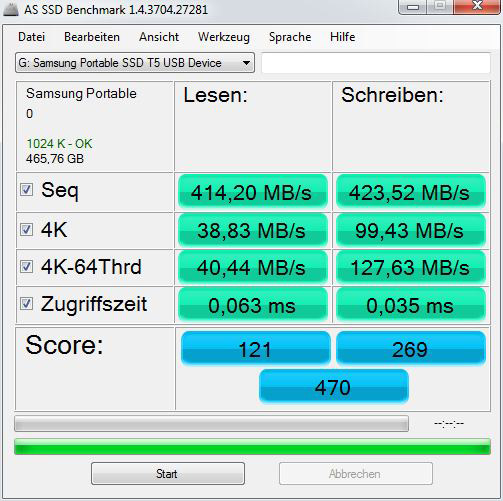
And here is yet a screenshot of AS SSD iops results:
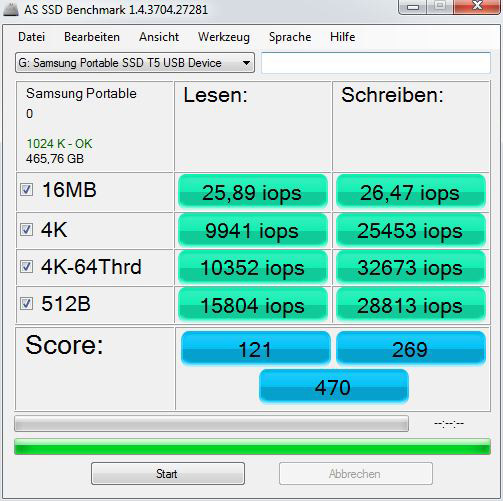
Here is a screenshot of the AS SSD copy benchmark values:
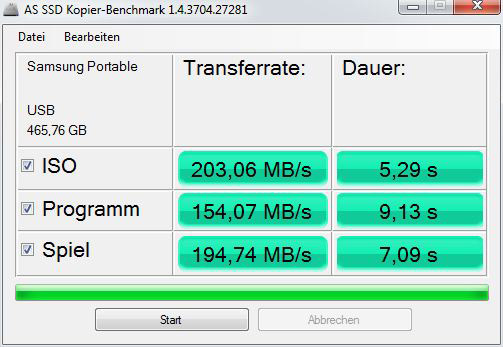
As mentioned on the previous page, we have tried to get everything out of the external USB 3.1 Gen2 SSD and have unofficially created tests with Windows 10. The Samsung T5 500GB Portable USB 3.1 SSD was able to achieve a read speed of 522.14 MB/s and a write speed of 498.63 MB/s in Windows 10. In AS SSD the Samsung T5 500GB Portable USB 3.1 SSD achieves a total score of 959 points!
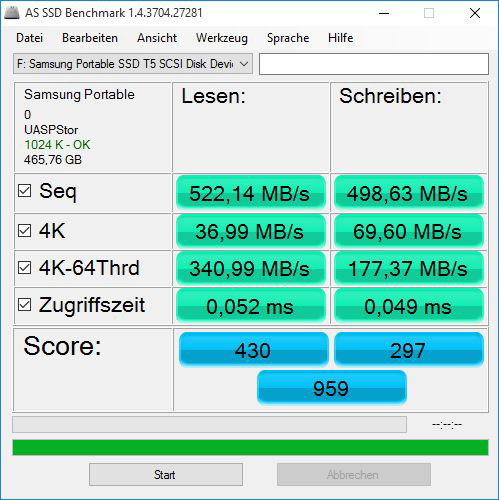
The comparison of the AS SSD benchmark results is extended with each new HDD/SSD test. Here you can see some SSDs in comparison to the Samsung T5 500 GB Portable USB 3.1 SSD, and the chart will be updated periodically with new SSD drives. At the moment the top of total AS SSD scores is lead from the Samsung 960 Pro M.2 NMVe SSD and in Windows 7, the new Samsung Portable T5 USB 3.1 SSD with 512 GB joins the bottom field. This is a great result for an external USB drive.
Here is a comparison of the AS SSD benchmark values, which are getting updated with new drives:
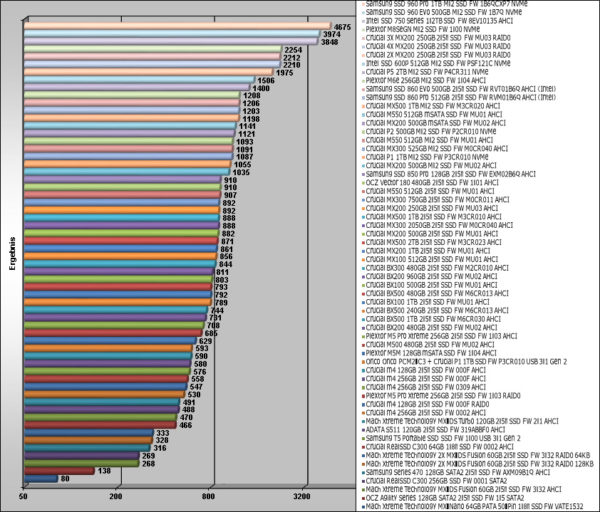
And here is an excerpt of the latest AS SSD benchmark results. For a better overview, they will be gradually replaced with latest drives:
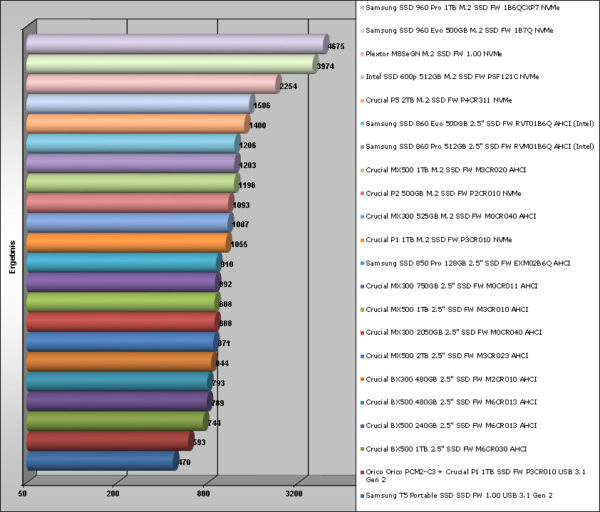
The ATTO disk benchmark values gives a very good overview about the write and read rate on different file sizes. These values are maximum ratings, which are different to the previously continuous transfer rate benchmarks, since this benchmark may even reach a higher overall performance with slower SSDs.
At the Samsung T5 500 GB Portable USB 3.1 SSD is the read speed (green) from a transfer size of about 64 KB higher than the write speed (red) and reaches the maximum read speed of 438006 KB at a transfer size of 512 KB. The new TLC V-NAND with 64 layers delivers an astonishingly smooth result, which we only know from MLC SSDs.
Here is a screenshot of the ATTO Disk benchmark values:
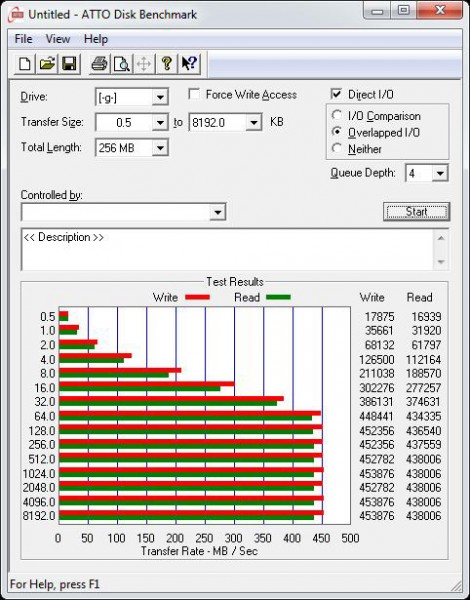
Unofficially, we have also created benchmarks with Windows 10. The Samsung T5 500GB Portable USB 3.1 SSD in Windows 10 achieves the maximum read values of 560538KB and the maximum write values of 534199KB with a transfer size of 512KB.
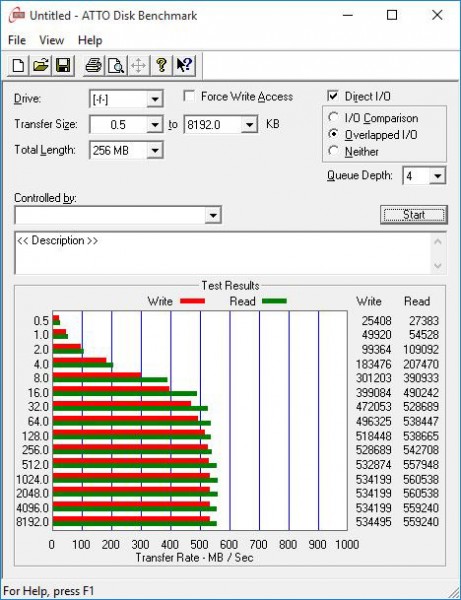
The ATTO disk benchmark values are compared with a small transfer size of 32KB and a large transfer size of 8192KB. The bar chart already includes a comparison to some SSDs and HDDs, with this Samsung T5 500GB Portable USB 3.1 Gen2 SSD in ATTO in Windows 7 also placed at the bottom of the SSDs. The SSD as an external USB drive achieves a great result.
Here is a comparison of the ATTO disk benchmark values, which are getting updated with soon coming drives:
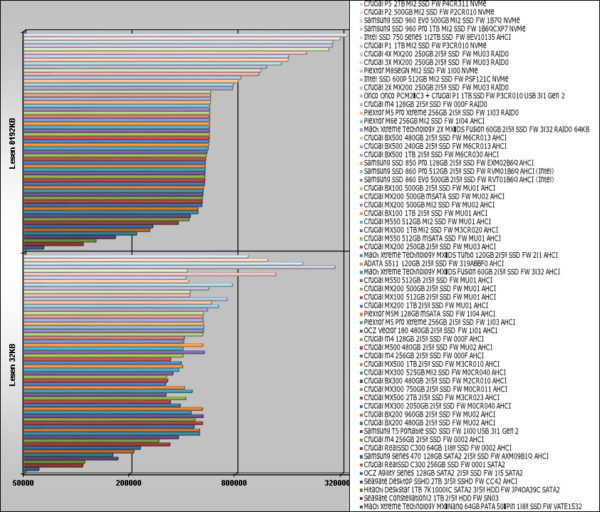
And here is an excerpt of the latest ATTO disk benchmark values for a better overview will be gradually replaced with latest drives:
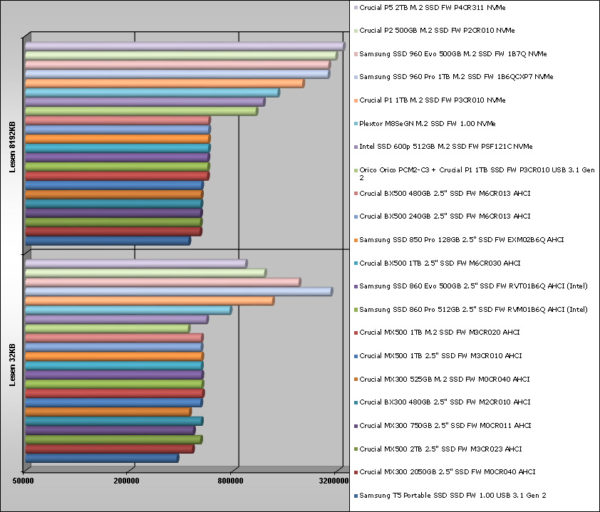
With CrystalDiskMark one receives a balanced measurement of the performance with different transfer sizes.
Here the Samsung Portable T5 512GB USB-C SSD reached sequential read values of 437.8 MB/s and write values of 451.4 MB/s.
Here is a screenshot of the CrystalDiskMark values:
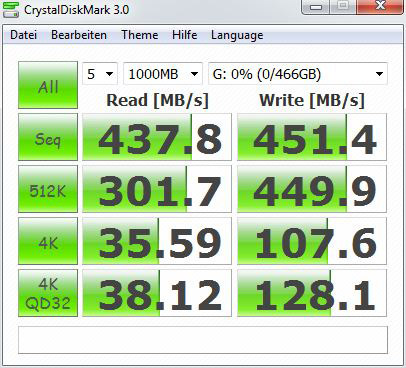
The following diagram shows the CrystalDiskMark results once again compared with other SSDs and platter drives, which are extended step by step. In the CrystalDiskMark comparison one can see significant differences between the to-date tested of the Solid State Drives and Hard Disk Drives.
Here is a comparison of the CrystalDiskMark values, which are getting updated with soon coming drives:
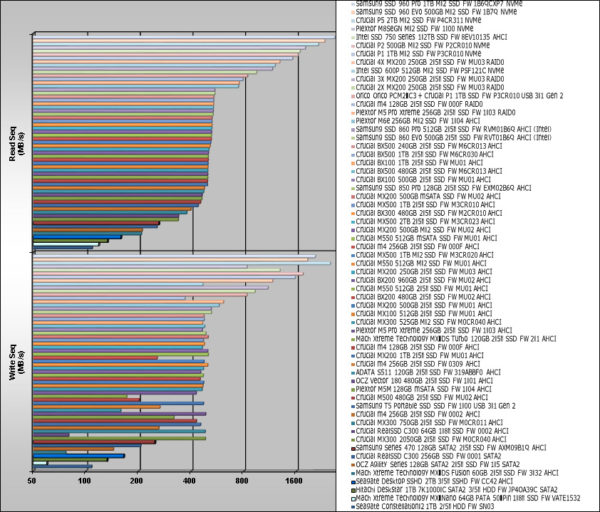
And here is an excerpt of the latest CrystalDiskMark values will be gradually replaced with latest drives for clarity:
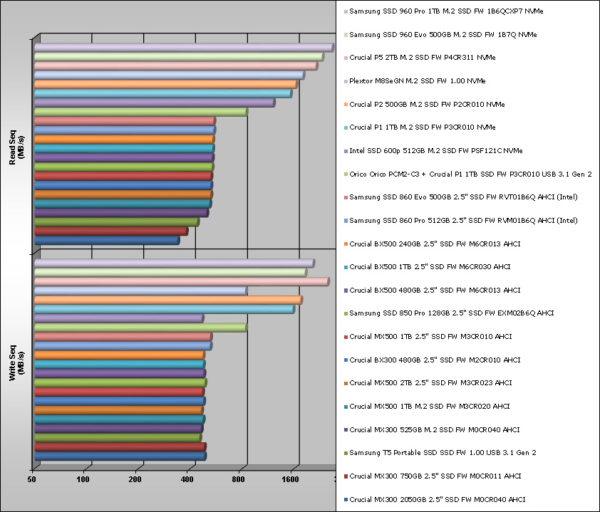
With HD Tach one can measure the gradient of the performance, but the SSD transfer is not comparable with a conventional HDD. New logical NAND cell access of the SSD controller results like some other equal designed SSDs in varying rates with the latest HD Tach Version 3.0.4.0 version, which is written for hard disk drives.
HD Tach shows with the Samsung T5 500GB Portable USB 3.1 Gen2 SSD a very continuous transfer image with one of the lowest displayed access times of 0.1ms with the Samsung T5 500GB Portable USB 3.1 Gen2 SSD during the read and write processes. The strong peaks in the previously tested TLC SSDs’ write operations are still missing.
To compare these results you can move the mouse over the following drives to see their respective benchmark results:
Samsung T5 Portable 500GB USB 3.1 SSD, ADATA S511 120GB SSD, ADATA S511 120GB SSD, Crucial BX200 960GB 2.5″ SSD, Crucial BX200 480GB 2.5″ SSD, Crucial BX100 1TB 2.5″ SSD, Crucial BX100 500GB 2.5″ SSD, Crucial MX100 512GB 2.5″ SSD, Crucial MX200 1TB 2.5″ SSD, Crucial MX200 500GB 2.5″ SSD, Crucial MX200 500GB M.2 SSD, Crucial MX200 500GB mSATA SSD, Crucial MX200 250GB 2.5″ SSD, 2x Crucial MX200 250GB 2.5″ SSDs RAID0, 3x Crucial MX200 250GB 2.5″ SSDs RAID0, 4x Crucial MX200 250GB 2.5″ SSDs RAID0, Crucial MX300 750GB 2.5″ SSD, Crucial MX300 525GB M.2 SSD at SATA3 AHCI, Crucial MX300 2050GB 2.5″ SSD, Crucial M500 480GB 2.5″ SSD, Crucial M550 512GB 2.5″ SSD, Crucial M550 512GB M.2 SSD, Crucial M550 512GB mSATA SSD, 2x Crucial m4 128GB 2.5″ SSD at SATA3 RAID, Crucial m4 128GB 2.5″ SSD, Crucial m4 128GB 2.5″ SSD at SATA3, Crucial m4 256GB 2.5″ SSD FW 000F, Crucial m4 256GB 2.5″ SSD FW 0309, Crucial m4 256GB 2.5″ SSD FW 0002, Crucial m4 256GB SSD FW 0309 at SATA3 IDE, Crucial m4 256GB 2.5″ SSD FW 0002 at SATA3, Crucial C300 64GB 1,8″ SSD at SATA3, Crucial RealSSD C300 256GB 2.5″ SSD at SATA3, Crucial RealSSD C300 256GB 2.5″ SSD at SATA2, Hitachi 7K1000.C 1TB HDD, Intel SSD 750 1200GB PCIe Karte Gen3 x4, MX-DS Fusion 60GB SSD SATA3 IDE, MX-DS Fusion 60GB SSD SATA3 IDE, MX-DS Turbo 120GB SSD, OCZ Agility 128GB SSD, OCZ Vector 180 480GB 2.5″ SSD, Plextor M8SeGN 512GB M.2 NVMe SSD at SATA3 AHCI, Plextor M6e 256GB M.2 SSD PCIe AHCI, 2x Plextor M5 Pro Xtreme 256GB 2.5″ SSD at SATA3 RAID0, Plextor M5 Pro Xtreme 256GB 2.5″ SSD, Plextor M5M 128GB mSATA SSD, Samsung 960 Evo 500GB M.2 PCIe NVMe Gen3 x4 SSD, Samsung 960 Pro 1TB M.2 PCIe NVMe Gen3 x4 SSD, Samsung Series470 128GB SSD AHCI, Samsung 470 128GB SSD Legacy IDE, Samsung 850 Pro 128GB 2.5″ SSD, Seagate Constellation.2 1TB 2.5″ HDD at SATA3, Seagate ST2000DX001 2TB 3.5″ SSHD, Toshiba MK8007GAH 1,8″ HDD.
Here is a screenshot of the HD Tach benchmark values:
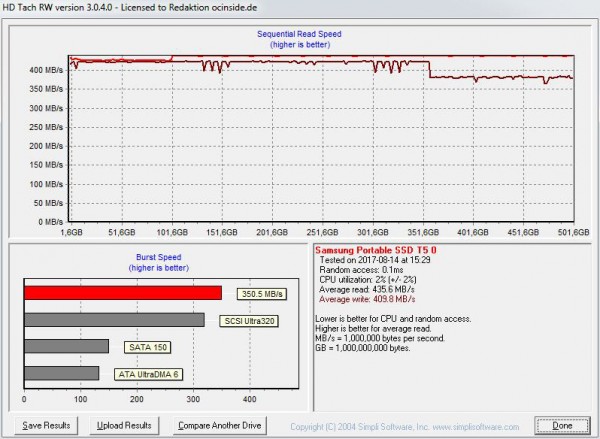
Here is a comparison of the HD Tach benchmark values, which are getting updated with soon coming drives:
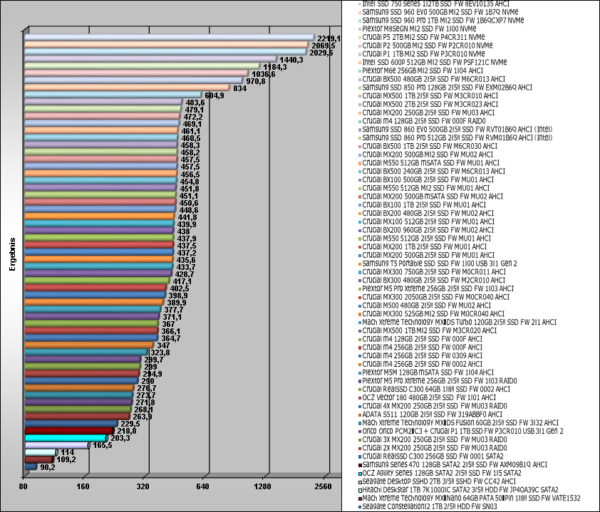
And here is an excerpt of the latest HD tach benchmark values that will be gradually replaced with latest drives for clarity:
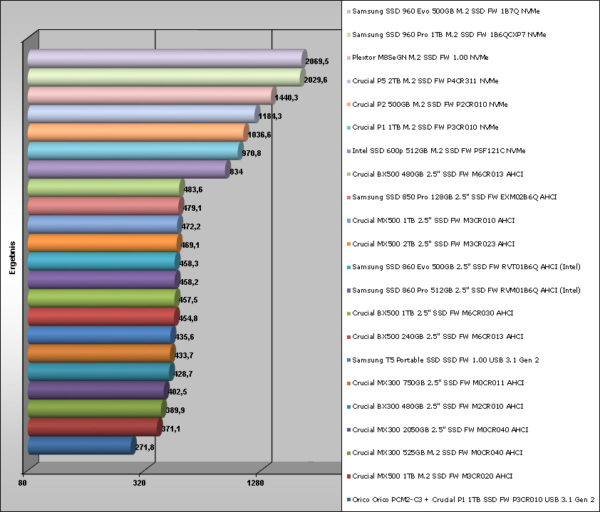
SiSoftware Sandra benchmark result …
SiSoftware Sandra benchmark should not be missing in this test series. SiSoftware offers with their SiSoft Sandra program a very comprehensive tool, which contains a lot of tools to get very reliable test results of all hardware components.
The average access time of the Samsung T5 500 GB Portable USB 3.1 SSD is in SiSoftware Sandra with 77us very low and the drive index of 429.48 MB/s is for an external SSD very high.
Here is a screenshot of the SiSoftware Sandra benchmark read values:

In the write performance measurement, the average access time of the Samsung T5 500 GB Portable USB 3.1 SSD in SiSoftware Sandra is also at very low 38us and the drive index reached for an external SSD very high 431.63 MB/s.
Here is a screenshot of the SiSoftware Sandra benchmark write values:

Here is a comparison of the SiSoftware Sandra benchmark values, which are getting updated with soon coming drives:
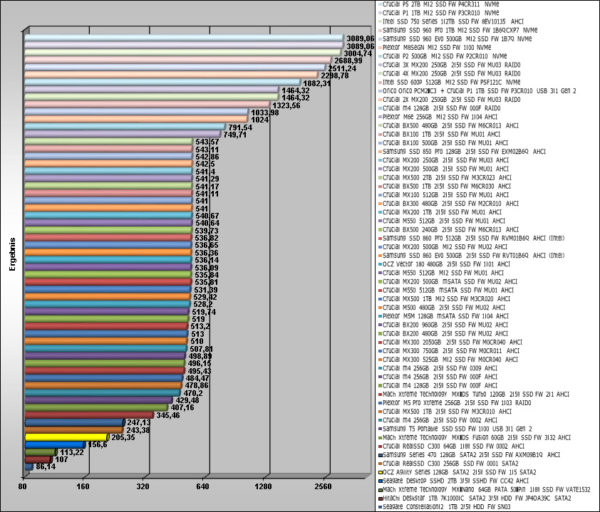
And here is an excerpt of the latest SiSoftware Sandra benchmark values that will be gradually replaced with latest drives for clarity:
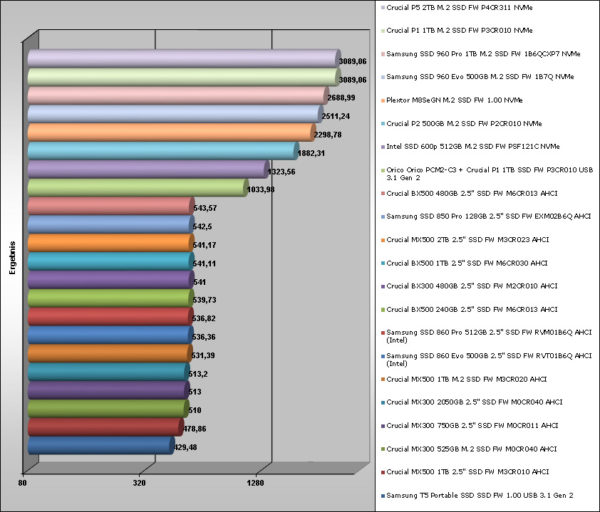
Samsung T5 500GB Portable USB 3.1 Gen2 Result and general impression …

